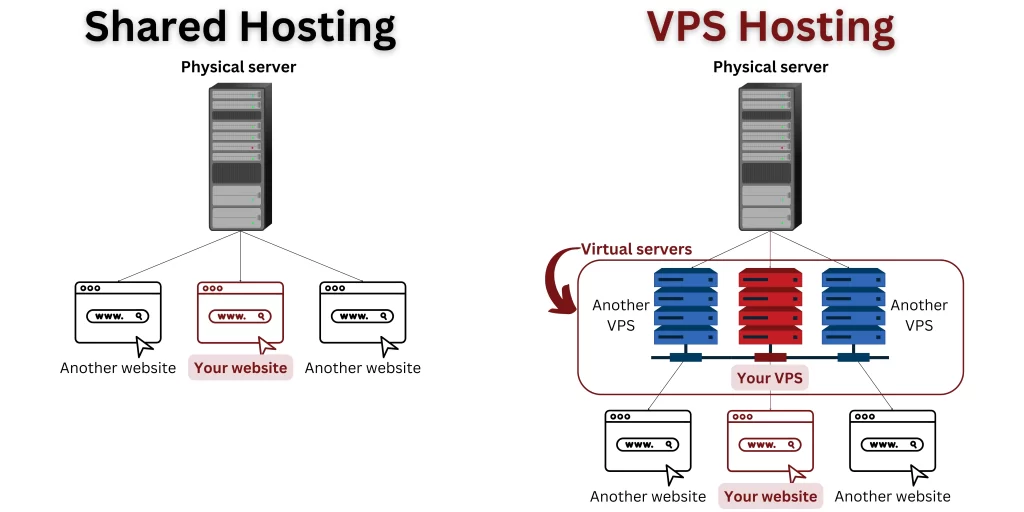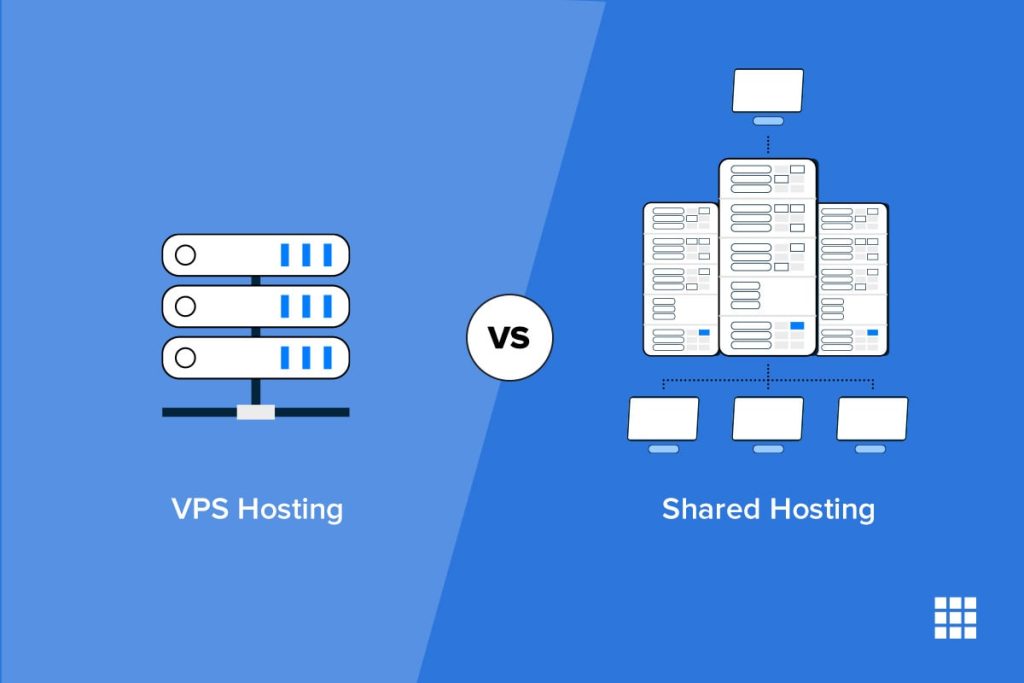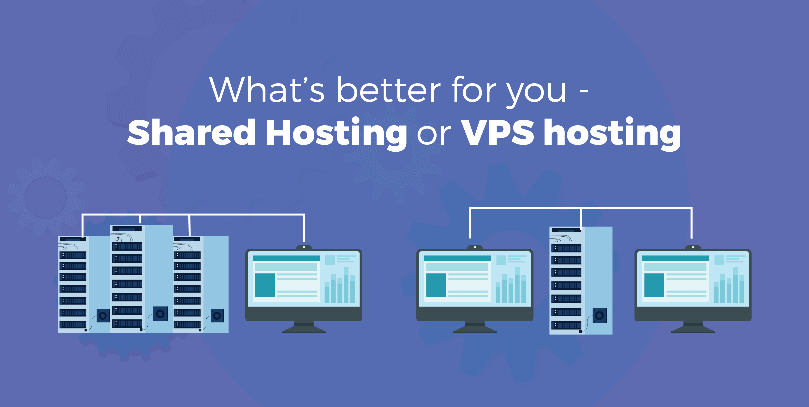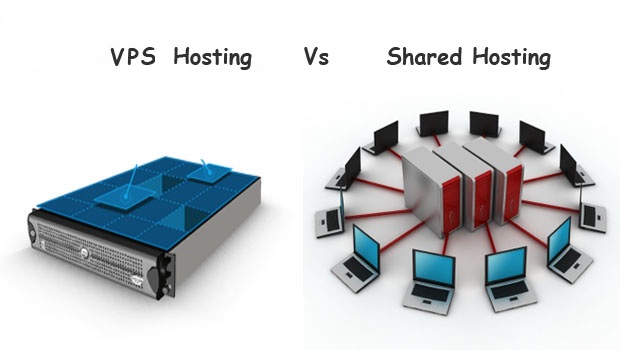Shared hosting and Virtual Private Server (VPS) hosting are two distinct types of web hosting services, each with its own set of features and characteristics.

Table of Contents
Shared Hosting
Shared hosting is a web hosting service where multiple websites share resources on a single server. In this setup, websites utilize the same server resources, including CPU, RAM, and storage space. This cost-effective hosting option is ideal for small to medium-sized websites with relatively low traffic. Shared hosting is characterized by its simplicity and ease of use, making it suitable for individuals, small businesses, or those just starting with their online presence
VPS Hosting

VPS hosting, on the other hand, offers a more advanced and flexible hosting environment. It involves the use of virtualization technology to create isolated virtual machines on a physical server. Each virtual server operates independently with dedicated resources, providing a higher level of control, customization, and performance. VPS hosting is suitable for websites that have outgrown the limitations of shared hosting or require specific configurations.
Difference of VPS & Shared Hosting

Resource Allocation
Shared Hosting: In shared hosting, multiple websites share the same server resources, including CPU, RAM, and disk space. This means that the resources are distributed among various users, and if one website experiences a surge in traffic, it may affect the performance of others on the same server.
VPS: Virtual Private Server hosting involves the use of virtualization technology to create isolated virtual machines on a physical server. Each VPS operates independently with its own dedicated resources, providing more control and stability compared to shared hosting.
Performance
Shared Hosting: Performance can be impacted if other websites on the shared server consume too many resources. It’s suitable for small to medium-sized websites with moderate traffic.
VPS: With dedicated resources, VPS hosting generally offers better performance and scalability. It’s a preferred choice for websites that require more consistent performance or have higher traffic demands.
Customization and Control
Shared Hosting: Limited customization options and control over server settings. Users typically rely on the hosting provider’s predefined configurations.
VPS Hosting: Users have more control over the server environment. They can install custom software, modify server configurations, and have greater flexibility in managing their hosting environment.
Security
Shared Hosting: Security is dependent on the hosting provider’s measures. Since multiple users share the same server, there’s a potential risk if one website is compromised.
VPS Hosting: Offers a higher level of security as each virtual server is isolated from others. Users can implement their own security measures and configurations.
Cost
Shared Hosting: Generally more affordable as the costs are distributed among multiple users sharing the same server.
VPS Hosting: Can be more expensive than shared hosting, but the increased performance and customization options justify the higher cost for websites with specific requirements.
Scalability
Shared Hosting: Limited scalability as resources are shared among multiple users. Not suitable for rapidly growing websites or those with fluctuating resource needs.
VPS Hosting: More scalable as users can easily upgrade their virtual server’s resources to accommodate increased traffic or additional services.
Pros of Shared Hosting
Cost-Effective: It is usually the most affordable option, making it ideal for individuals, small businesses, or those with a limited budget.
Ease of Use: It is user-friendly, and the hosting provider takes care of server management tasks, making it suitable for those with little technical expertise.
Maintenance and Updates: Server maintenance, security updates, and software installations are handled by the hosting provider, reducing the workload for users.
Scalability for Small Sites: It can be sufficient for small websites with moderate traffic, allowing users to start small and upgrade as their website grows.
Community Support: It is a common choice, and many resources and forums provide support for users facing similar challenges.
Cons of Shared Hosting
Limited Resources: Resources such as CPU, RAM, and disk space are shared among multiple websites on the same server, which can result in slower performance during traffic spikes or if other sites consume a disproportionate share of resources.
Less Control: Users have limited control over server configurations and settings compared to other hosting options like VPS or dedicated hosting.
Security Concerns: Security risks exist as multiple websites share the same server. If one website is compromised, it may affect the security of others on the server.
Customization Restrictions: Customization options are limited, and users may be restricted in installing certain applications or configuring advanced settings.
Performance Variability: Since the server’s resources are shared, the performance of your website can be impacted by the activities of other users on the same server.
Pros of VPS Hosting
Dedicated Resources: Each VPS operates independently with its own dedicated resources, ensuring consistent performance and minimizing the impact of other users on the server.
Customization and Control: Users have greater control over server settings, allowing them to install custom software, configure security settings, and tailor the environment to their specific needs.
Scalability: It is more scalable than shared hosting. Users can easily upgrade their virtual server’s resources as their website grows and demands more power.
Enhanced Security: The isolated nature of VPS environments enhances security, reducing the risk associated with sharing a server with other users.
Improved Performance: It generally offers better performance compared to shared hosting, making it suitable for websites with higher resource demands or consistent traffic.
Root Access: Users often have root access or administrative privileges, allowing them to make system-level changes and configurations.
Cons of VPS Hosting
Cost: VPS hosting is more expensive than shared hosting, and the cost increases with the allocated resources. It may not be the most budget-friendly option for small websites or those with limited financial resources.
Technical Expertise Required: Managing a VPS requires a higher level of technical knowledge compared to shared hosting. Users need to be familiar with server configurations, security settings, and system maintenance.
Responsibility for Server Management: While VPS providers handle hardware maintenance, users are responsible for server-level configurations, updates, and security measures.
Limited Physical Resources: Despite dedicated resources, a VPS is still limited by the physical resources of the underlying server. Extremely resource-intensive websites may require a dedicated server.
Potential Overhead: Virtualization introduces some overhead, and while it’s minimal, it can impact performance compared to a dedicated server.
How do choose?

Shared hosting is a cost-effective option for small to medium-sized websites with moderate traffic, while VPS hosting provides more control, better performance, and scalability for websites with higher resource demands and specific customization requirements. The choice between shared and VPS hosting depends on the individual needs and goals of the website owner.

